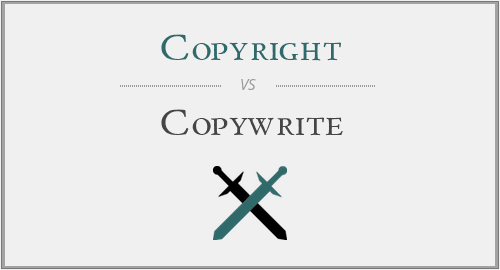Copyright
Copyright is a noun, which means exclusive legal rights of something – a work of art, music, document, poem, film name or any original work. This object or piece of work cannot be copied or used without permission from the owner or payment for the usage.
You can remember the word as copy + right or the right to copy, i.e. the rights or authorization to copy something or reproduce it. The word itself originated from the two words, copy and right.
People use copyrights to protect their work from being copied or used illegally. For example, if you post original content on the web, it is automatically copyrighted as your work. Copyright is indicated using the © logo.
Example usage:
· You can view the poem, but you cannot edit or copy it as it is not copyrightable. (here copyright is used as an adjective)
· The copyrighter has allowed only read permissions for the document.
· This copyrighted piece of information is quite important for our project, so we have to mention the source if we want to include it in our document.
· Finally, after a long struggle, I secured the copyright on the name of the movie.
Copywrite
Well, Copywrite is never used as such, but copywriter is the right word, which refers to a person who writes content for advertising. A copywriter writes the product/service taglines, captions, slogans and such creative content for a company to promote their brand.

Remember this word with the two words writer and copy, meaning writer of a copy of some content! The word originated from the words copy and writer.
Also remember that copywriter writes documents like brochures, sales letters, magazines, catalogs, etc. for publicity, brand awareness or marketing of the company for which he/she is writing.
Example usage:
· Copywriting is not everyone’s cup of tea; it requires a lot of out-of-the-box thinking!
· I need a copywriter urgently for my project.
· What should I do to get a job in a copywriting agency?
· Can you send me a list of some good copywriters?
Remember the difference between both these words using the last part of the word – right or write. While speaking, you have to be more careful in understanding the context. When it comes to creating content, think copywriter with the ‘w’, while when some legal talks are going on about protecting a content, think copyright with the ‘r’. Here is the last example, where we use both words for you to understand the difference better –
“Our copywriter has done a great job in writing this blog; I think we should apply for copyrights so that no one else can misuse our content.”




Have a discussion about this article with the community:
Report Comment
We're doing our best to make sure our content is useful, accurate and safe.
If by any chance you spot an inappropriate comment while navigating through our website please use this form to let us know, and we'll take care of it shortly.
Attachment
You need to be logged in to favorite.
Log In